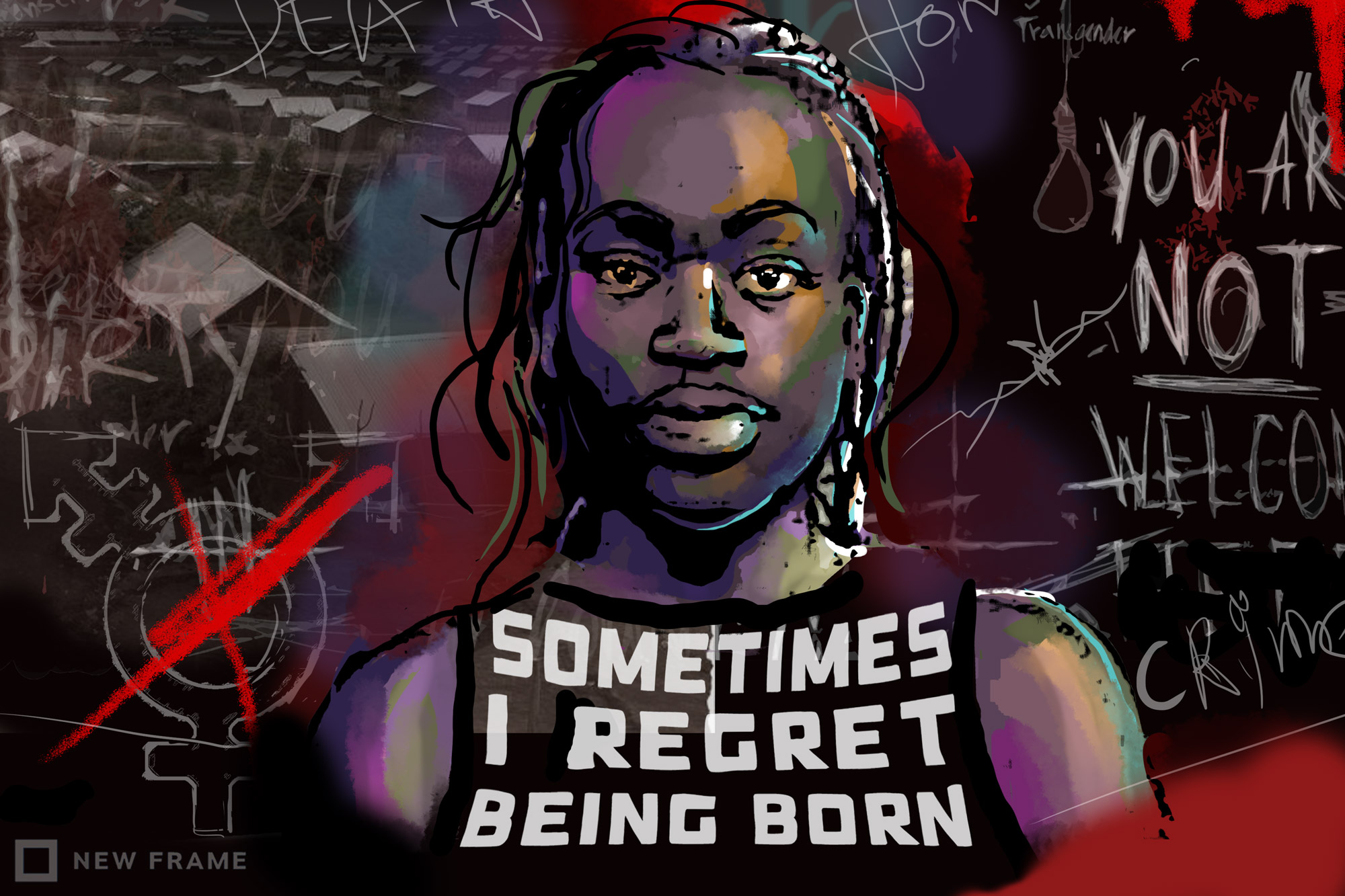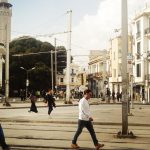‘They told me homosexuals have no place in this world’
After fleeing Uganda to escape persecution, a transgender asylum seeker ended up in a Kenyan refugee camp – only to be targeted by groups there.
Author:
3 December 2019

“Sometimes I regret being born,’’ says Paul Kanyamu, a transgender asylum seeker, who fled his home in Uganda to Kenya after his community attacked him.
Since then, he longs for a sense of safety.
But Kenya, which still criminalises gay sex, brings no relief for this 34-year-old. Kenya doesn’t explicitly protect people from discrimination on the basis of their gender identity-although there are some movements which are protecting transgender persons.
Although he has taken refuge at the United Nations Kakuma Refugee Camp, the recurring nightmare in which LGBTQIA+ persons are targeted and killed has followed him from Uganda.
Earlier this month, Kanyamu was attacked and sexually assaulted by two refugees because of his gender and sexual orientation. Kanyamu’s faces double stigma- his gender identity is transgender, while his sexual orientation is homosexual.
“They asked me why do I look like a woman … They told me homosexuals have no place in this world, so I need to be killed,” says Kanyamu.
Related article:
“I thought, Oh, my Jesus … They then squeezed my neck, touched me and threw me down. They pulled my genitals … One of them brought a sharp knife from his pocket and said, ‘I’m going to kill you today.’… He then cut me on my neck … I screamed but nothing came out because they had covered my mouth … I cried.”
Kanyamu was convinced he would die that day. But an old woman who was passing by intervened and asked the men what was going on. The attackers fled.
“I am totally living in fear. At any time I can be killed. The other refugees around me have warned me they are going to kill me … My life is in danger … People threaten me because I’m a transgender. I can’t hide my identity – like my physical appearance. So I don’t know what else I can do,” says Kanyamu.
This isn’t the first attack. About a month ago, an unidentified refugee assaulted Kanyamu while he was taking a shower and attempted to rape him. In another incident, he was beaten and his money was stolen.
No protection from authorities
Speaking to Kanyamu days after the most recent attack, he feels outrage. Despite reporting the attack to the United Nations High Commission for Refugees (UNHCR) office, which runs the camp, he says they have been “radio silent”. He has also reported the incident to the police.
“After the attack, I felt a lot of pain. I felt angry but I also felt ignored by the UNHCR – the agency that is supposed to protect me. I have always reported these persecutions to protection officers, but nothing has been done to protect me and other LGBTIs.”
Kanyamu wants the UNHCR to relocate him to another, safer area.
At the United Nations hospital he was given only paracetamol. He had to travel to a rural clinic outside the camp to have his wound dressed, at his own expense.
The UNHCR says it is aware of the incident and “strongly condemns” attacks against LGBTQIA+ people.
Related article:
“As with any reported security incident, UNHCR follows up with relevant authorities in order to best offer support to those impacted. In this case, UNHCR was made aware that the complainant reported the incident to the police two days following the alleged attack, but was unable to identify the perpetrators,” says Dana Hughes, UNHCR spokesperson for the East, Horn and Great Lakes region.
She says Kanyamu was treated for “mild pains” at a partner health facility, run by the International Rescue Committee, where he was examined and found to suffer “no serious injuries”.
But Kanyamu felt his injuries were serious. He sustained bruises to his abdomen and a cut to the neck. The psychological trauma still lingers, together with the fear of being killed.
Everyday transphobia
Kakuma Refugee Camp and its expanded area, the Kalobeyei Integrated Settlement, is home to just under 200 000 refugees and asylum seekers. There are many people from the LGBTQIA+ community who live in the camp.
Kanyamu says his community does not feel safe. They are threatened and mocked every day.
“We try and stick together … Sometimes someone spits in our food … Most of the LGBTI refugees don’t work because society knows us.”
About a week after the most recent attack, another transgender asylum seeker was stoned by a transphobic and “homophobic gang” in Turkana community. Their reasoning? “LGBTIs are agents of poverty and drought in their area.”
On the same evening, a group of 13 people harassed LGBTQIA+ groups in the camp.
“They ambushed us at the reception … and started throwing stones at us. They were shouting: ‘Homosexuals, homosexuals. What do you want? We are going to kill you all’,” says Kanyamu.
The UNHCR says it was also made aware of this incident, after “a small group of Turkana youth clashed with protesting LGBTI refugees”.
“The UNHCR is not aware of any reported criminal gangs from the local community roaming the camp and attacking refugees,” says Hughes.
Related article:
Kanyamu also alleges the camp manager has told him and others on several occasions that they “don’t want gays” living in the area. But the UNHCR insists it has no information about these statements.
Hughes says that while the UNHCR condemns such attacks on the LGBTQIA+ community in the camp, the main responsibility for safety lies with the Kenyan government.
“UNHCR continues to work closely with the government of Kenya, which is responsible for the physical security of all persons residing in the country, supporting the government to enhance security measures in Kakuma and other refugee-hosting areas.”
Life in Uganda
Kanyamu fled Kampala, Uganda, in August this year, on a journey of more than 13 hours to neighbouring Kenya.
Anti-gay laws in Uganda have meant he had never been openly out in his home country, where homosexuality is treated as a criminal act, punishable by life imprisonment. The Ugandan government has also announced its intention to bring back the “Kill the Gays” Bill, which could see members of LGBTQIA+ community punished by death.
Last month, an alert was sent out over WhatsApp warning the community that they were being “hunted”. This came after the brutal death of LGBTQIA+ activist John Wasswa, who was attacked in Jinja with a panga.
“You cannot publicly announce that you are homosexual because they will kill you on the spot,” says Kanyamu.
He speaks of the everyday acts of hate he has suffered, including being denied medical treatment by nurses. “People would mock me, belittle me and threaten to beat me … I sometimes regret being born, because I am discriminated against and segregated because I am transgender.”
Related article:
For years he kept his sexual orientation a secret. The only person who knew his secret was his grandmother, who threatened to out him many times.
Then he was exposed.
The notorious Red Pepper tabloid published an article about him. The tabloid made international headlines in 2014 for its anti-LGBTQIA+ propaganda when it published the names and pictures of 200 activists.
A journalist for the paper witnessed, captured and then published the mob attack on Kanyamu, which was carried out because he was “caught red handed doing forbidden acts”. He was beaten and stripped naked.
The article reads: “Paul was then grabbed, beaten to a pulp by angry residents who were chanting anti-homosexuality slogans and they also brought tires to set him ablaze … His family has cursed and disowned him … and had vowed to kill him the moment he resurfaces.”
“I was rendered a reject and an outcast. My parents are still hunting for me. To kill me,” says Kanyamu.
Correction, 5 December 2019: A word in this article was changed to reflect the language that should be used when reporting on transgender related issues.




